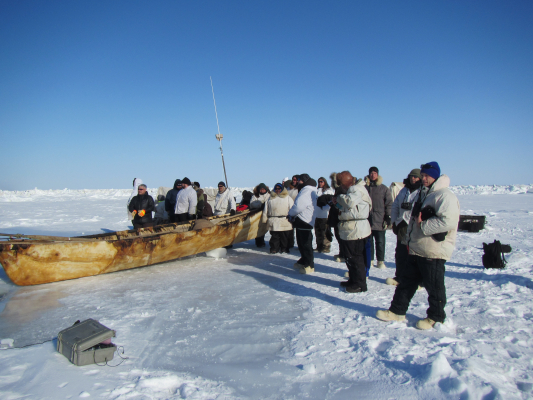Successful conclusion to meeting of the
Aboriginal Subsistence Whaling Working Group (ASWWG)
Good progress has been reported from a workshop to improve the process and handling of Aboriginal Subsistence Whaling quota renewals.
Aboriginal Subsistence Whaling (ASW) is conducted in some of the world’s most remote regions. It is community-based and does not seek to maximise either catches or profits. Regulation of aboriginal whaling is an important responsibility of the Commission, whose role is to ensure that the whale populations remain healthy, and the nutritional and cultural requirements of indigenous people are met.
The ASWWG was established in 2012 with the aim of proposing solutions to a number of long-running issues. Last week’s workshop was their final gathering before the six yearly renewal of aboriginal catch limits, which are on the agenda for the IWC’s biennial meeting in Brazil this September.
Aboriginal hunts are undertaken in the USA (Alaska), Russia (Chukotka), Denmark (Greenland) and St Vincent and the Grenadines (Bequia). The most recent workshop was held in Barrow, Alaska. Wherever possible, the ASWWG has tried to hold meetings in places where subsistence whaling takes place. This is to show at first-hand and to participants from all over the world, the unique environment and communities in which indigenous whaling takes place.
At this workshop, the ASWWG was able to conclude discussions and propose a way forward on several long-standing and complex topics. The report of the group, which included representatives from a wide range of national governments, hunting communities, and non-governmental organisations, provides comprehensive advice, proposals and options, which it’s hoped will equip the Commission to reach a consensus view on quota renewals in September.
Important developments included finalising arrangements for a new, web-based ‘Description of the Hunt’ template that will enable the very different ASW communities to share information about their hunts in an easily accessible and consistent way.
The Group also discussed how best to integrate the IWC’s management of ASW within the wider international framework of conventions and treaties on indigenous rights, and developed several cost-effective proposals to build an IWC presence in key fora.
Also agreed by the group was the need for the IWC to formally recognise that change is inherent in all communities, including indigenous communities, and the ‘authenticity’ of an indigenous hunt should not be questioned simply because modern technology and tools are used, not least because these can improve animal welfare and the efficiency of the hunt.
The report of the April 2018 ASWWG Workshop will be available shortly.
To read more about ASW, including previous reports of the ASWWG please click here.

